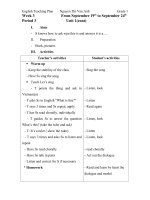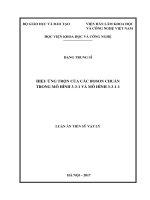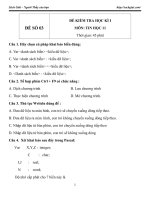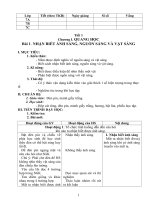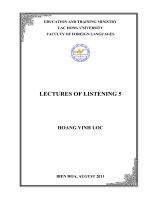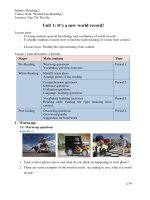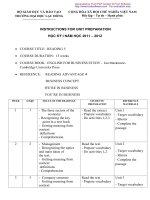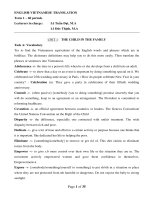Com TRANSLATION 1 VB1 HTNGUYEN WEEK 3 4
Bạn đang xem bản rút gọn của tài liệu. Xem và tải ngay bản đầy đủ của tài liệu tại đây (1.64 MB, 8 trang )
Generated by Foxit PDF Creator © Foxit Software
For evaluation only.
WEEK 3 : TRANSLATION TECHNIQUE 2 :
TRANSLATING PASSIVE SENTENCES
NOTES
Passive forms and passive constructions are so much part of English that they will occur naturally in all
kind of language from the highly technical to the colloquial.
WAYS OF TRANSLATING PASSIVE SENTENCES
1. PASSIVE SENTENCES IN ENGLISH CAN BE TRANSLATED INTO PASSIVE IN VIETNAMESE
The killer was arrested by the local police
He was poisoned to death
They can’t be allowed to do that
He was assassinated / He was shot in the chest 5 times
Black people were first brought to America as slaves
Many colleges and universities are privately supported
2. PASSIVE SENTENCES IN ENGLISH CAN BE TRANSLATED INTO ACTIVE IN VIETNAMESE
Manual labor was highly valued
Weren’t you asked not to make so much noise?
The thief was seen running away
Voices were heard calling for help
An opportunity not to be missed
3. SOME PASSIVE STRUCTURES IN ENGLISH
Structure 1
It ‘s widely rumored that…
It ‘s generally thought that…
It’s widely believed that …
It’s widely assumed that…..
Structure 2
He is said to….
He is rumored to…
He is alleged to ….
He is believed to…
He is reported to…
Structure 3
He is to be pitied :
He is not to be blamed
It’s an opportunity not to be missed
Generated by Foxit PDF Creator © Foxit Software
For evaluation only.
Structure 4
Great importance is attached to + Noun
More attention needs to be paid to + Noun
More emphasis should be made to + Noun
Care must be taken to + Verb
THE LANGUAGE OF SIGNS AND NOTICES
The language of signs and notices is, in a sense, a special language with its own set forms and
expressions. The same message in one language may be expressed in quite different words in another.
Therefore, the importance of context is stressed. Translators should interpret the message in terms of
their own culture- which is not necessarily the same as translating the words.
THE PASSIVE FORMS WHICH OFTEN OCCUR IN NOTICES
must ( not) be / should always be / is to be…
not allowed/ prohibited/ not permitted
You are reminded/ informed/ requested/ expected … ,
Examples:
o These doors must be kept clear at all times
o Bathing and fishing strictly prohibited
o This is a place of worship. Silence is requested during services
Read some of the most often seen public signs / notices / regulations and suggest an equivalent in
Vietnamese for each one – not necessarily a translation but the wording that could be expected in the
same context.
Generated by Foxit PDF Creator © Foxit Software
For evaluation only.
TRANSALTE INTO VIETNAMESE
Generated by Foxit PDF Creator © Foxit Software
For evaluation only.
Generated by Foxit PDF Creator © Foxit Software
For evaluation only.
WEEK 4
TRANSLATIONTECHNIQUE 3:
TRANSLATING PARTICIPLE PHRASES AS AN ADVERBIAL
(The –ing, -ed, and –en forms )
Present (-ing ) and past participle (-ed and -en) phrases can be used as an adverb, equivalent to an
adverb clause modifying the finite verbs. Similar to adverb clauses, these phrases can be used as an
adverb of time, reason, result, condition , concession or manner
Generated by Foxit PDF Creator © Foxit Software
For evaluation only.
1. Adverbial of time
Taking off from an Atlantic coast airport, the plane is soon flying over the gentle slope of the
Appalachian Mountains
Hearing the news, they immediately set off for the railway station.
The work done, we went to the bathroom to take a shower.
2. Adverbial of reason
Not knowing the language , she failed to understand what they were talking about.
Attracted by reports of great economics opportunities and religious and political freedom,
immigrants from many countries flocked to the United States in increasing number, reaching the
peak in the years 1880- 1914
Deeply moved by the play, she could hardly keep back her tears.
The children, exhausted, fell asleep at once
3. Adverbial of result
Attracted by reports of great economics opportunities and religious and political freedom,
immigrants from many countries flocked to the United States in increasing number, reaching the
peak in the years 1880- 1914
The mixture among consumers , producers and government change constantly, making a
dynamic rather than a static economy
In another development, the population and the labor force have moved dramatically from
farms to cities, from the fields to the factories , and above all to service industries, thus providing
more personal and public services .
4. Adverbial of condition
Working hard, you will succeed.
Turning to the right, you will see the post office
United, we stand, divided, we fall.
Used economically, one tin will last for at least two months.
5. Adverbial of concession
Weighing almost one hundred pounds, the box was lifted by him with one him
Generated by Foxit PDF Creator © Foxit Software
For evaluation only.
Granting the achievements to be great, we have no reason to be conceited.
Defeated, he remains a popular athlete
Even if invited, I wouldn’t go
6. Adverbial of manner
Let’s started as arranged.
He came back, utterly exhausted
Americans tend to answer questions directly and literally, often ignoring important underlying
concerns
TRANSLATE INTO ENGLISH
Kẻ trôm đã giết vợ chồng người chủ tiệm vàng và con gái của họ, lấy đi một số lượng lớn vàng
Bão Irene hoành hành tại nước Mỹ, làm chết hơn 30 người , phá hủy nhiều cây cối và làm mất điện trên
diện rộng
Vì ăn cắp tiền trong hành lý của hành khách , một nhân viên mặt đất của VN Airlines đã bị bắt và giao cho
cảnh sát khu vực ( Thanhnien 28.8.2011)
TRANSLATE INTO ENGLISH
HOC TẠI VIETNAM, LÀM VIỆC TẠI NƯỚC NGOÀI
Trước đây người ta thường nghĩ chỉ sinh viên Việt Nam du học tại nước ngoài mới có nhiều cơ
hội cạnh tranh trên thị trường lao động quốc tế. Hiện nay, không ít sinh viên Việt Nam được đào
tạo hoàn toàn trong nước đã có thể đi khắp thế giới làm việc như một công dân toàn cầu
Đào tạo để xuất khẩu
Đào tạo để xuất khẩu là một điều còn rất mới mẻ với hệ thống giáo dục đại học của Việt Nam.
Tuy nhiên, ĐH FPT đã giúp sinh viên bước ra thị trường thế giới bằng khả năng của mình.
Khóa tốt nghiệp ĐH đầu tiên ĐH FPT đã có nhiều SV được các nước trên thế giới đón nhận: 3
sinh viên mới bảo vệ xong đồ án đã được yêu cầu chuẩn bị ngay cho chuyến sang Anh làm
việc, cùng nhiều nhóm sinh viên đi Singapore, Đức, Mỹ, Malaysia… Nhiều sinh viên khác được
mời sang tập đoàn tài chính lớn của Nhật Bản - tập đoàn SBI Holding với mức lương trên 50
triệu đồng/ tháng chưa kể chi phí hỗ trợ nhà ở và đi lại… Với kết quả đó có thể coi ĐH FPT là
một trong những trường ĐH của Việt Nam thành công trong việc “xuất khẩu” sinh viên ra nước
ngoài học tập và làm việc.
Để có được thành công đó, SV theo học tại ĐH FPT phải tuân thủ nghiêm ngặt chương trình
đào tạo và quy trình đào tạo theo chuẩn quốc tế, đồng thời bắt buộc học hai ngoại ngữ (tiếng
Anh - tiếng Nhật với khối ngành CNTT-TT, tiếng Anh, tiếng Trung với khối ngành Kinh tế - Tài
chính ứng dụng CNTT). Đặc biệt, sau khi kết thúc năm học thứ hai, ĐH FPT bắt buộc SV đi
thực tập từ 8-12 tháng, như một nhân viên chính thức tại các doanh nghiệp. Ngoài ra việc đào
Generated by Foxit PDF Creator © Foxit Software
For evaluation only.
tạo kĩ năng mềm và tạo môi trường học tập, thi cử minh bạch cũng trang bị cho SV sự tự tin,
trung thực và kiến thức thật sự. Có lẽ đây chính là bí quyết để ĐH FPT có nhiều SV được mời
sang nước ngoài học tập và làm việc… (Thanhnien 26/8/2011)
